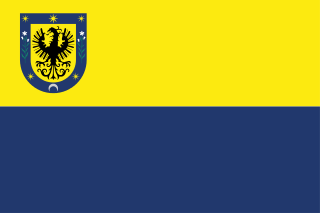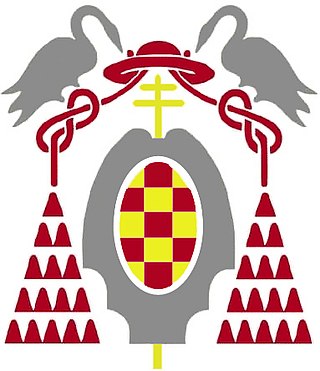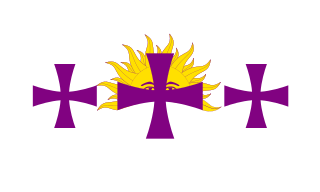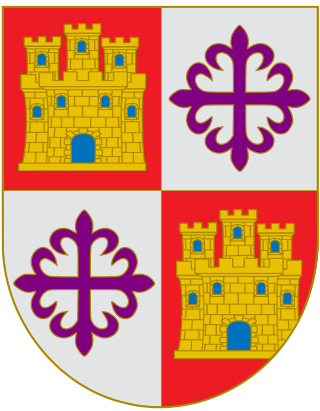
Concepción is a city and commune in central Chile, and the geographical and demographic core of the Greater Concepción metropolitan area, one of the three major conurbations in the country. It has a significant impact on domestic trade being part of the most heavily industrialized region in the country. It is the seat of the Concepción Province and the capital of the Bío Bío Region. It sits about 500 km south of the nation's capital, Santiago.

The University of Salamanca is a Spanish higher education institution, located in the city of Salamanca, in the autonomous community of Castile and León. It was founded in 1218 by King Alfonso IX. It is the oldest university in the Hispanic world and one of the oldest in the world in continuous operation. It has over 30,000 students from 50 different nationalities.

Luis de León, was a Spanish lyric poet, Augustinian friar, theologian and academic, active during the Spanish Golden Age.

The University of Alcalá is a public university located in Alcalá de Henares, a city 35 km northeast of Madrid in Spain and also the third-largest city of the region. It was founded in 1293 as a Studium Generale for the public, and was refounded in 1977. The University of Alcalá is especially renowned in the Spanish-speaking world for its annual presentation of the highly prestigious Cervantes Prize. The university currently enrolls 28,336 students, 17,252 of whom are studying for undergraduate degrees, who are taught by a teaching staff of 2,608 professors, lecturers and researchers belonging to 24 departments. The administrative tasks are carried out by the university's Administration and Services, comprising approximately 800 people.

Hispanidad is a Spanish term alluding to the group of people, countries, and communities that share the Spanish language and Hispanic culture. The term can have various, different implications and meanings depending on country of origin, socio-political views, and cultural background.
The University of Granada is a public university located in the city of Granada, Spain, and founded in 1531 by Emperor Charles V. With more than 60,000 students, it is the fourth largest university in Spain. Apart from the city of Granada, UGR also has campuses in Ceuta and Melilla.

In Spain, Portugal and Latin American countries, a tuna is a group of university students in traditional university dress who play traditional instruments and sing serenades. The tradition originated in Spain and Portugal in the 13th century as a means of students to earn money or food. Nowadays students don't belong to a "tuna" for money nor food; rather, they seek to keep a tradition alive, for fun, to travel a lot and to meet new people from other universities. A senior member of a tuna is a "tunante," but is usually known simply as a "tuno." The word “tuno” also refers to anyone who is a member of a tuna, although the first conceptualisation is more used among tunas. Newbies are known as "caloiros", "novatos" or "pardillos."

The Roman Catholic Diocese of Salamanca is a diocese located in the city of Salamanca in the Ecclesiastical province of Valladolid in Spain.

Pedro Fernández de Castro "the Castilian" was a Castilian nobleman, son of Fernando Rodríguez de Castro and Estefanía Alfonso la Desdichada. He inherited the Infantazgo of León from his parents and was mayordomo mayor of Fernando II and his son Alfonso IX of León.

Garci Lasso de la Vega II, also known as “El Joven” was the son of Garci Lasso de la Vega "El Viejo" with his first wife, Juana de Castañeda. He commanded Castillian troops against Navarra in the Battle of Río Salado of 1334. After distinguishing his valor, he was appointed as the highest royal official to the court of Fadrique Alfonso de Castilla, master of the Order of Santiago and son of Alfonso XI of Castile. He was later appointed Adelantado of Castile through the patronage of Juan Núñez de Lara. After the death of his patron, he sought refuge in Burgos, fearing the wrath of Juan Alfonso de Alburquerque. King Pedro I and his loyal men found him there where he suffered an atrocious death witnessed by the king in 1351, as reported by Pero López de Ayala in his chronicle on the reign of this monarch.

The Battle of Linuesa was an action fought on 21 December 1361 in the city of Huesa, Kingdom of Jaén. The battle was fought between the Kingdom of Castile and the forces of the Emirate of Granada. The battle resulted in a victory for the forces of the Kingdom of Castile.

Juan de Mella was a Spanish Roman Catholic bishop and cardinal.
Petrus Martinez de Osma was a Spanish theologian and philosopher, known for his views on indulgences, which he retracted at the end of his life.

Enrique Enríquez the Younger was a nobleman of Castile, son of Enrique Enríquez the Elder. He was lord of Villalba de los Barros, Nogales, Almendral, La Parra, Begíjar and other towns. He was Adelantado Mayor of the border of Andalusia, chief justice of the King's House, Chief of the forces of the bishopric and Kingdom of Jaén, Mayor of Seville and Knight of the Band.

Enrique Enríquez the Elder was a nobleman of Castile, natural son of the Infante Henry of Castile. He was Lord of La Puebla de los Infantes. His son, Enrique Enríquez the Younger, had a distinguished career serving kings Alfonso XI of Castile and Peter of Castile.

Enrique Gil Robles (1849–1908) was a Spanish law scholar and a Carlist theorist. In popular public discourse he is known mostly as father of José María Gil-Robles y Quiñones. In scholarly debate he is recognized principally as one of key ideologues of Traditionalism; some authors view him also as major representative of a theory of law known as iusnaturalismo.
Black Serenade is a 2001 Spanish slasher film directed and written by Pedro L. Barbero and Vicente J. Martín about a serial killer who, dressed with a tuno cape and a mask, kills underperforming university students.
Asesinato en la universidad is a 2018 Spanish historical thriller film directed by Iñaki Peñafiel, written by Antonio Asencio and Clara Pérez Escrivá and starring Leonor Watling, Patrick Criado and Fernando Soto. It was released on La 1 and it is set in the Universidad de Salamanca in the 16th century.

The Universidad Nacional del Altiplano de Puno is a public university located in the city of Puno, Peru.
Rafael Salazar Motos, better known as the Calderas de Salamanca was a singer (cantaor) of copla and flamenco. He was the brother of fellow singer Rafael Farina.















